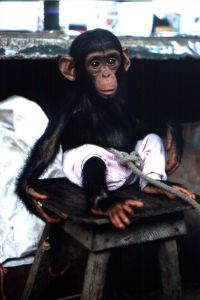What the live Trade in Wildlife means for Chimpanzees
There is a large and very organized international network of people, illegally moving chimpanzees out of Africa and into more developed countries...
In the world today, there is a thriving, illegal trade in live animals. Most people don't even know this exists. The movement of live animals out of Africa and the bushmeat trade are interconnected - in Africa, when hunters shoot a chimp mother for meat, her offspring often survives, clinging to her body. These babies are removed from the mother and often become a part of the live animal trade. You will be shocked by some of the places they go...
FOLLOW ALONG ON OUR CHRONICLE OF A CHIMP CAUGHT IN THE ILLEGAL WILDLIFE TRADE ROUTE - WHERE DO THEY GO...?
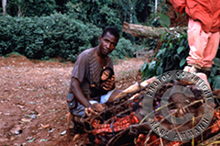 Leaving the Forest forever – A chimpanzee mother may be shot for bushmeat - the infant clinging to its mother often survives. While still in the forest, the hunter will usually butcher the mother, chopping the meat into manageable pieces that can be carried out. In a hunter's camp, the meat may be smoked to preserve it. All of this is usually watched by the orphaned infant. A baby chimp will be carried out of the forest by the hunter, as seen in this photo. Sometimes, a 'cinch belt' is tied around the waist so that they can be tethered in one place.
Leaving the Forest forever – A chimpanzee mother may be shot for bushmeat - the infant clinging to its mother often survives. While still in the forest, the hunter will usually butcher the mother, chopping the meat into manageable pieces that can be carried out. In a hunter's camp, the meat may be smoked to preserve it. All of this is usually watched by the orphaned infant. A baby chimp will be carried out of the forest by the hunter, as seen in this photo. Sometimes, a 'cinch belt' is tied around the waist so that they can be tethered in one place.
THE INFANT'S FIRST (AND SOMETIMES LAST) STOPS...
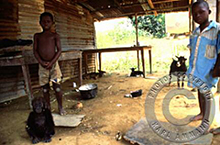 The Hunters Village – The next stop for a chimpanzee infant whose mother has been shot for her meat is the village of the hunter, where they are usually tied up and sometimes kept as a pet. Young infants often die from dehydration and malnourishment before they make it to the market. (Watch this heartbreaking video of a chimp in a village in DRC Congo). If the hunter has access to good roads, the infant will be brought to the local market, where it is sold, most likely to an animal dealer who is part of the illegal trade in wildlife.
The Hunters Village – The next stop for a chimpanzee infant whose mother has been shot for her meat is the village of the hunter, where they are usually tied up and sometimes kept as a pet. Young infants often die from dehydration and malnourishment before they make it to the market. (Watch this heartbreaking video of a chimp in a village in DRC Congo). If the hunter has access to good roads, the infant will be brought to the local market, where it is sold, most likely to an animal dealer who is part of the illegal trade in wildlife.
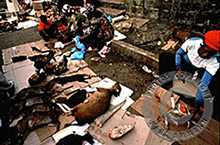 A local market – The infant is usually brought to the local market where it may be sold for meat or more likely end up in the hands of an international animal dealer. The capture of an infant chimp for the live trade is actually more lucrative than selling the meat of the mother at the market - an adult chimp carcass nets only about $100 U.S. dollars, whereas the price of a live baby chimp is about $50,000 U.S. dollars (to buyers outside Africa). This means that the business of trading in live babies may be more dangerous to the survival of chimpanzees than any other threat they face.
A local market – The infant is usually brought to the local market where it may be sold for meat or more likely end up in the hands of an international animal dealer. The capture of an infant chimp for the live trade is actually more lucrative than selling the meat of the mother at the market - an adult chimp carcass nets only about $100 U.S. dollars, whereas the price of a live baby chimp is about $50,000 U.S. dollars (to buyers outside Africa). This means that the business of trading in live babies may be more dangerous to the survival of chimpanzees than any other threat they face.
FROM THE DEALER, AN INFANT CHIMP MAY BE EXPORTED OUT OF AFRICA USING FAKE CITES PERMITS.
Chimpanzees may be sent anywhere in the world, but the majority end up in the Far or Middle East, in Europe, and in the United States. WHAT ARE THEY FORCED TO DO IN THEIR NEW WORLDS...?
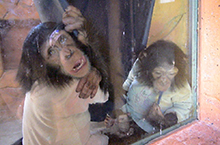 Photo Oppurtunity – Some chimps end up at tourist destinations, as 'photo opportunities' for the unenlightened tourist (beach resorts in Egypt, Turkey, Tunesia, Russia and Ukraine feature chimpanzees dressed like humans). People pay money to have their picture taken with them. What is the psychology behind this strange human behavior? Do we want to impress friends with our bravery or exotic adventures in another land? Are we trying to capture ourselves with the little piece of the wild that these animals represent? Usually these infants live alone in cramped, dirty cages and are sometimes drugged to ensure docility in a picture.
Photo Oppurtunity – Some chimps end up at tourist destinations, as 'photo opportunities' for the unenlightened tourist (beach resorts in Egypt, Turkey, Tunesia, Russia and Ukraine feature chimpanzees dressed like humans). People pay money to have their picture taken with them. What is the psychology behind this strange human behavior? Do we want to impress friends with our bravery or exotic adventures in another land? Are we trying to capture ourselves with the little piece of the wild that these animals represent? Usually these infants live alone in cramped, dirty cages and are sometimes drugged to ensure docility in a picture.
Was ist die Psychologie der Menschen für ein solches Verhalten? Wollen wir unsere Freunde mit einem exotischen Abenteuer aus einem fernen Land beeindrucken? Versuchen wir ein Stück Wildnis zu erhaschen, vergessen dabei aber, dass diese Schimpansen illegal gefangen wurden? Normaler weise werden diese Foto Schimpansen bis zum Fototermin alleine in kleinen, dunklen, dreckigen, stinkenden Gehegen gehalten und sie leiden sehr darunter.
Tengwood.org would like to point out that having a picture taken with an animal who is going through this type of trauma is cruel and will never evoke a pleasant memory. Please RESIST THE URGE to have your picture taken with a chimp!
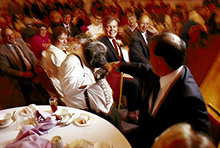 Entertainment Industry – Chimpanzees are commonly seen in advertisments and on television shows, where they appear docile and friendly. What you might not know is that most shows and ads feature very young chimps - from 2-6 years of age - who have been taken from their mothers as infants and raised by humans in an unnatural environment. In the wild, these 'performing' babies would still depend on their mother, which is why they usually seem so docile and eager to be held. Training methods for captive chimps are usually harsh – chimps are strong and not usually given to submission. One of the ways that trainers ensure docility around humans is by beating or dominanting the chimp when aggression occurs. Often, a performing primate's teeth are removed and/or shock collars used to punish misbehavior. Even the most 'positive' trainers use methods that are the equivalent of someone forcing their four-year old to perform amusing tricks for an audience, over and over. As a 'performing' chimp gets older and bigger in size, the price of this abuse is a chimp who may become unexpectedly aggressive to the people around him/her. Because of this tendancy, most 'performing' chimps, excepting the most submissive adults, will be euthanized at around 7-10 years of age to make way for a new baby.
Entertainment Industry – Chimpanzees are commonly seen in advertisments and on television shows, where they appear docile and friendly. What you might not know is that most shows and ads feature very young chimps - from 2-6 years of age - who have been taken from their mothers as infants and raised by humans in an unnatural environment. In the wild, these 'performing' babies would still depend on their mother, which is why they usually seem so docile and eager to be held. Training methods for captive chimps are usually harsh – chimps are strong and not usually given to submission. One of the ways that trainers ensure docility around humans is by beating or dominanting the chimp when aggression occurs. Often, a performing primate's teeth are removed and/or shock collars used to punish misbehavior. Even the most 'positive' trainers use methods that are the equivalent of someone forcing their four-year old to perform amusing tricks for an audience, over and over. As a 'performing' chimp gets older and bigger in size, the price of this abuse is a chimp who may become unexpectedly aggressive to the people around him/her. Because of this tendancy, most 'performing' chimps, excepting the most submissive adults, will be euthanized at around 7-10 years of age to make way for a new baby.
Please join with Tengwood.org in boycotting products which use chimpanzees in magazine ads, commercials, television shows and movies! These performing animals are never happy and their 'smile' is only a grimace of submission and fear.
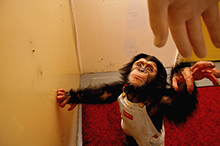 Exotic Pet – Chimpanzees are part of the live animal trade because many people in the U.S., Europe, and other developed countries STILL think that a chimp makes a good pet – this is just not true! Chimps are very clever, wild animals that are never 'tamed' by living with humans - only confused about this strange, unnatural world. When a chimpanzee begins to mature, they will also begin to use their own natural social rules with the people around them - they are, after all, a chimp! Chimp societies in the wild normally use aggression to maintain dominance hierarchies and may attack and bite one another in an altercation. As an adult, a chimp has over three times the strength of a man and can become very dangerous to a human caretaker.
Exotic Pet – Chimpanzees are part of the live animal trade because many people in the U.S., Europe, and other developed countries STILL think that a chimp makes a good pet – this is just not true! Chimps are very clever, wild animals that are never 'tamed' by living with humans - only confused about this strange, unnatural world. When a chimpanzee begins to mature, they will also begin to use their own natural social rules with the people around them - they are, after all, a chimp! Chimp societies in the wild normally use aggression to maintain dominance hierarchies and may attack and bite one another in an altercation. As an adult, a chimp has over three times the strength of a man and can become very dangerous to a human caretaker.
Recent news stories feature 'pet' chimps attacking humans. Many 'pets' end up in roadside zoos or sanctuaries when they become 'unmanagable' to their owners. Tengwood.org can assure you that a chimp NEVER makes a good pet!
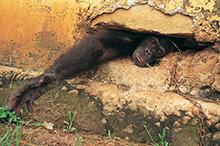 Medical Labs and Zoos – Some chimpanzees become residents in unenlightened zoos or medical labs. A good zoo is ethical about how they obtain their animals. The AZA in the U.S., and EAZA in Europe, are both zoo organizations that attempt to regulate zoos - a zoo must pass an inspection and abide by the organization's guidelines to belong - this includes not importing CITES Appendix I animals such as the drill or chimpanzee. 'CITES' (part of UNEP, the CBD, and the IUCN) is the regulatory body for the global import and export of animals. In accredited zoos, most mammals have been born in captivity. In unaccredited zoos, this is not the case and animals may be purchased from dealers who captured them from the wild (Tengwood.org would like to point out that many zoos, including some accredited zoos, still purchase birds and reptiles from dealers who obtain them from the wild!). But participation in all of these 'regulatory' organizations is voluntary. Corruption is present in many source countries and CITES papers are easily forged (see Karl Ammann's website above for cases where CITES permits are forged or CITES regulations don't work). Believe it or not, even today chimps can still be bought from the wild by unscrupulous institutions!
Medical Labs and Zoos – Some chimpanzees become residents in unenlightened zoos or medical labs. A good zoo is ethical about how they obtain their animals. The AZA in the U.S., and EAZA in Europe, are both zoo organizations that attempt to regulate zoos - a zoo must pass an inspection and abide by the organization's guidelines to belong - this includes not importing CITES Appendix I animals such as the drill or chimpanzee. 'CITES' (part of UNEP, the CBD, and the IUCN) is the regulatory body for the global import and export of animals. In accredited zoos, most mammals have been born in captivity. In unaccredited zoos, this is not the case and animals may be purchased from dealers who captured them from the wild (Tengwood.org would like to point out that many zoos, including some accredited zoos, still purchase birds and reptiles from dealers who obtain them from the wild!). But participation in all of these 'regulatory' organizations is voluntary. Corruption is present in many source countries and CITES papers are easily forged (see Karl Ammann's website above for cases where CITES permits are forged or CITES regulations don't work). Believe it or not, even today chimps can still be bought from the wild by unscrupulous institutions!
DeThe live animal trade may bring about the extinction of the chimpanzee sooner than any other factor. Whenever you see a chimp on television or in magazines, understand that a number of chimps have suffered to bring this about; not only the chimp made to perform unnatural behaviors for human entertainment, but all the chimps who died during capture and transport for this one, live baby to reach its destination...
It is estimated that for every chimp sold into the pet trade, approximately 10 adults/other babies may have been killed or died.
Chimpanzees are our closest relatives, but their place is in the forest, not in a human setting. Their similarity to us is most impressive when observed in their natural environment - they are beautiful in their own way - and they are not human.




















